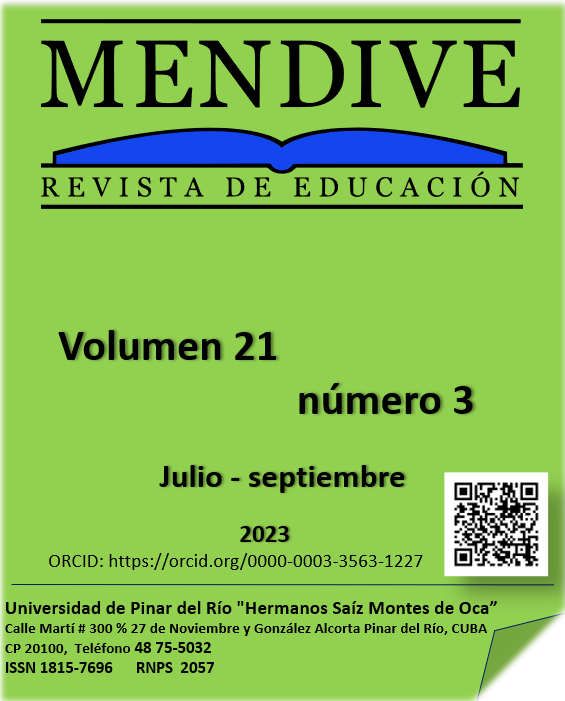Conocimiento del profesorado y su relación con el rendimiento matemático del estudiantado
Contenido principal del artículo
Resumen
Descargas
Detalles del artículo

Esta obra está bajo una licencia internacional Creative Commons Atribución-NoComercial 4.0.
Citas
Ball, D., Thames, M. y Phelps, G. (2008). Content knowledge for teaching: what makes it special? Journal of Teacher Education, 59(5), 389-407. https://doi.org/10.1177/0022487108324554
Copur-Gencturk, Y. y Tolar, T. (2022). Mathematics teaching expertise: A study of the dimensionality of content knowledge, pedagogical content knowledge, and content-specific noticing skills. Teaching and Teacher Education, 114(103696). https://doi.org/10.1016/j.tate.2022.103696
Copur-Gencturk, Y. (2021). Teachers' conceptual understanding of fraction operations: results from a national sample of elementary school teachers. Educational Studies in Mathematics, 107(3), 525-545. https://doi.org/10.1007/s10649-021-10033-4
Cueto, S., León, J., Sorto, M. A. y Miranda, A. (2017). Teachers' pedagogical content knowledge and mathematics achievement of students in Peru. Educational Studies in Mathematics, 94(3), 329-345. https://doi.org/10.1007/s10649-016-9735-2
del Río Hernández, M., Susperreguy, M., Salinas, V., Córdova, K. y Marín, A. (2022). El aprendizaje matemático en el hogar durante la pandemia de covid-19 desde la perspectiva de las madres: diferentes escenarios de acuerdo con el nivel socioeconómico. Calidad en la Educación, (57), 199-230. https://doi.org/10.31619/caledu.n57.1252
Fokides, E. y Alatzas, K. (2022). Using digitally enhanced tangible materials for teaching fractions: Results of a project. Technology, Knowledge and Learning, 1-25. https://doi.org/10.1007/s10758-022-09605-X
Jiang, Z., Mok, I. A. C. y Li, J. (2020). Chinese students' hierarchical understanding of part-whole and measure subconstructs. International Journal of Science and Mathematics Education, 19(7), 1441 1461. https://doi.org/10.1007/s10763-020-10118-1
Kieren, T. E. (1976). On the mathematical, cognitive, and instructional foundations of rational numbers. In R. A. Lesh & D. A. Bradbard (Eds.), Number and measurement. Papers from a research workshop (pp. 101-144). ERIC Information Analysis Center for Science, Mathematics, and Environmental Education. https://eric.ed.gov/?id=ED120027
Pouta, M., Lehtinen, E. y Palonen, T. (2021). Student teachers' and experienced teachers' professional vision of students' understanding of the rational number concept. Educational Psychology Review, 33(1), 109128. https://doi.org/10.1007/s10648-020-09536-y
Shulman, L. S. (1986). Those who understand: Knowledge growth in teaching. Educational Researcher, 15(2), 4-14. https://doi.org/10.2307/1175860
Stelzer, F., Richard's, M. M., Andrés, M. L., Vernucci, S. y Introzzi, I. (2021). Cognitive and maths-specific predictors of fraction conceptual knowledge. Educational Psychology, 41(2), 172-190. https://doi.org/10.1080/01443410.2019.1693508
Tchoshanov, M., Cruz, M. D., Huereca, K., Shakirova, K., Shakirova, L. y Ibragimova, E. N. (2017). Examination of lower secondary mathematics teachers' content knowledge and its connection to students' performance. International Journal of Science and Mathematics Education, 15(4), 683-702. https://doi.org/10.1007/s10763-015-9703-9
Xu, C., Li, H., Burr, S. D. L., Si, J., LeFevre, J. A. y Huang, B. (2022). Divide and conquer: Relations among arithmetic operations and emerging knowledge of fraction notation for Chinese students in grade 4. Journal of Experimental Child Psychology, 217(105371). https://doi.org/10.1016/j.jecp.2021.105371


